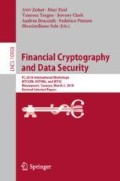Abstract
We propose a way to reconcile the apparent contradiction between the immutability of idealized smart contracts and the real-world need to update contracts to fix bugs and oversights. Our proposal is to raise the contract’s level of abstraction to guarantee a specification \(\varphi \) instead of a particular implementation of that specification. A combination of proof-carrying code and proof-aware consensus allows contract implementations to be updated as needed, but so as to guarantee that \(\varphi \) cannot be violated by any future upgrade.
We propose proof-carrying smart contracts (PCSCs), aiming to put formal correctness proofs of smart contracts on the chain. Proofs of correctness for a contract can be checked by validators, who can enforce the restriction that no update can violate \(\varphi \). We discuss some architectural and formal challenges, and include an example of how our approach could address the well-known vulnerabilities in the ERC20 token standard.
Access this chapter
Tax calculation will be finalised at checkout
Purchases are for personal use only
Notes
- 1.
This unfortunately restricts the possible valid semantics of the ERC20 implementation, later in the paper we will propose yet a 3rd implementation that is thread safe without being subject to this restriction.
- 2.
For the purposes of this paper, we assume that the compiler is able to translate proofs & invariants for the source language (e.g. Solidity) into proofs & invariants for the host language (e.g. EVM bytecode).
- 3.
A dummy contract which always terminates with an exception should vacuously satisfy the specification, since, for example, under the Ethereum model of execution, a contract could run out of gas and terminate at any point anyway.
- 4.
Generally-speaking, a parent contract can include arbitrary computation as long as it is accompanied by its own proof.
References
Atzei, N., Bartoletti, M., Cimoli, T.: A survey of attacks on ethereum smart contracts (SoK). In: Maffei, M., Ryan, M. (eds.) POST 2017. LNCS, vol. 10204, pp. 164–186. Springer, Heidelberg (2017). https://doi.org/10.1007/978-3-662-54455-6_8
Barnett, M., Chang, B.-Y.E., DeLine, R., Jacobs, B., Leino, K.R.M.: Boogie: a modular reusable verifier for object-oriented programs. In: de Boer, F.S., Bonsangue, M.M., Graf, S., de Roever, W.-P. (eds.) FMCO 2005. LNCS, vol. 4111, pp. 364–387. Springer, Heidelberg (2006). https://doi.org/10.1007/11804192_17
Barnett, M., Leino, K.R.M., Schulte, W.: The spec# programming system: an overview. In: Barthe, G., Burdy, L., Huisman, M., Lanet, J.-L., Muntean, T. (eds.) CASSIS 2004. LNCS, vol. 3362, pp. 49–69. Springer, Heidelberg (2005). https://doi.org/10.1007/978-3-540-30569-9_3
Bobot, F., Filliâtre, J.C., Marché, C., Melquiond, G., Paskevich, A.: The Why3 platform. http://why3.lri.fr/manual.pdf. Accessed 14 Jan 2018
Daian, P., Breidenbach, L.: Parity proposals’ potential problems. http://hackingdistributed.com/2017/12/13/ether-resurrection/. Accessed 14 Jan 2018
DAO: the DAO smart contract. Accessed 8 Feb 2017
Ethereum. https://github.com/ethereum/. Accessed 14 Jan 2018
Filliâtre, J.-C., Paskevich, A.: Why3—where programs meet provers. In: Felleisen, M., Gardner, P. (eds.) ESOP 2013. LNCS, vol. 7792, pp. 125–128. Springer, Heidelberg (2013). https://doi.org/10.1007/978-3-642-37036-6_8
Grossman, S., et al.: Online detection of effectively callback free objects with applications to smart contracts. In: ACM SIGPLAN Symposium on Principles of Programming Languages (POPL) (2018)
Hicks, M., Nettles, S.: Dynamic software updating. ACM Trans. Program. Lang. Syst. 27(6), 1049–1096 (2005). https://doi.org/10.1145/1108970.1108971
Hildenbrandt, E., et al.: KEVM: a complete semantics of the ethereum virtual machine. Technical report (2017)
Hirai, Y.: Defining the ethereum virtual machine for interactive theorem provers. In: Brenner, M., et al. (eds.) FC 2017. LNCS, vol. 10323, pp. 520–535. Springer, Cham (2017). https://doi.org/10.1007/978-3-319-70278-0_33
Leino, K.R.M.: Dafny: an automatic program verifier for functional correctness. In: Clarke, E.M., Voronkov, A. (eds.) LPAR 2010. LNCS (LNAI), vol. 6355, pp. 348–370. Springer, Heidelberg (2010). https://doi.org/10.1007/978-3-642-17511-4_20
Leroy, X., et al.: The CompCert verified compiler. Documentation and user’s manual, INRIA Paris-Rocquencourt (2012)
Luu, L., Chu, D.H., Olickel, H., Saxena, P., Hobor, A.: Making smart contracts smarter. In: Proceedings of the 2016 ACM SIGSAC Conference on Computer and Communications Security. CCS 2016, pp. 254–269. ACM, New York (2016). https://doi.org/10.1145/2976749.2978309
Necula, G.C.: Proof-carrying code. In: Proceedings of the 24th ACM SIGPLAN-SIGACT Symposium on Principles of Programming Languages. POPL 1997, pp. 106–119. ACM, New York (1997). https://doi.org/10.1145/263699.263712
Sergey, I., Hobor, A.: A concurrent perspective on smart contracts. CoRR abs/1702.05511 (2017). http://arxiv.org/abs/1702.05511
Sirer, E.G.: Parity’s Wallet Bug is not Alone (2017). https://blogs.apache.org/foundation/entry/apache-struts-statement-on-equifax. Accessed 05 Nov 2017
Various: formal verification for solidity contracts. https://forum.ethereum.org/discussion/3779/formal-verification-for-solidity-contracts. Accessed 14 Jul 2018
Vladimirov, M., Khovratovich, D.: ERC20 API: an attack vector on approve/transferfrom methods. https://docs.google.com/document/d/1YLPtQxZu1UAvO9cZ1O2RPXBbT0mooh4DYKjA_jp-RLM/edit#heading=h.m9fhqynw2xvt. Accessed: 14 Jan 2018
The Ethereum Wiki: ERC20 token standard. https://theethereum.wiki/w/index.php/ERC20_Token_Standard. Accessed 14 Jan 2018
Author information
Authors and Affiliations
Corresponding author
Editor information
Editors and Affiliations
Rights and permissions
Copyright information
© 2019 International Financial Cryptography Association
About this paper
Cite this paper
Dickerson, T., Gazzillo, P., Herlihy, M., Saraph, V., Koskinen, E. (2019). Proof-Carrying Smart Contracts. In: Zohar, A., et al. Financial Cryptography and Data Security. FC 2018. Lecture Notes in Computer Science(), vol 10958. Springer, Berlin, Heidelberg. https://doi.org/10.1007/978-3-662-58820-8_22
Download citation
DOI: https://doi.org/10.1007/978-3-662-58820-8_22
Published:
Publisher Name: Springer, Berlin, Heidelberg
Print ISBN: 978-3-662-58819-2
Online ISBN: 978-3-662-58820-8
eBook Packages: Computer ScienceComputer Science (R0)

